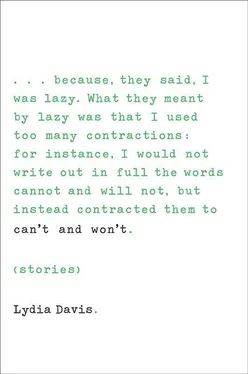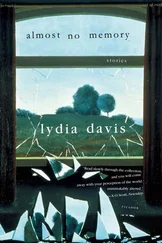There aren’t many people in the car, and they’re pretty quiet today. I don’t mind telling someone if he talks too long on his cell phone. I did that once. I gave this man ten minutes, maybe even more, maybe twenty, and then I went and stood there next to him in the aisle. He was hunched over with his finger pressed against his free ear. He didn’t get angry. He looked up at me, smiled, waved his hand in the air, and ended the call before I was back in my seat. I don’t do business on my cell phone on the train. They should know better.
* * *
There were also gifts of a different kind that she gave — the effort she went to for other people, the work she put into preparing meals for friends. The wanderers she took into her house, to live for weeks or months — kids passing through, but also, one year, that thin old Indian who spent every day arranging her books in the bookcases, and who ate so little and meditated so long. And later her old father, her actual father, the one she first met when she was already grown up, not my father, not the father who raised her. She had had a dream about him, that he was very ill. She had set out to find him, and she had found him.
She was so tired by the end of the day that whenever I was there visiting, when we all sat watching some program or movie on television in the evening, she would fall asleep. First she was awake for a while, curious about the actors — who is that, didn’t we see him in…? — and then she would grow quiet, she was quiet for so long that you would look over and see that her head was leaning to the side, the lamplight shining on her light hair, or her head was bowed over her chest, and she would sleep until we all stood up to go to bed.
What was the last present she gave me? Seven years ago. If I had known it was the last, I would have given it such careful attention.
If it wasn’t animal-themed or made by some indigenous person, then it was probably some kind of a bag, not an expensive bag, but one that had a special feature, a trick to it, like it folded into itself when it was empty, and then zipped up and had a little clip on it so you could clip it onto another bag. I have a few of those stored away.
She carried them herself, and other kinds of bags, always open and full of things — an extra sweater, another bag, a couple of books, a box of crackers, a bottle of something to drink. There was a generosity in how much she packed and carried with her.
One time when she came to visit — I’m thinking of her bags leaning in a group against a chair of mine. I was nearly paralyzed, not knowing what to do. I don’t know why. I didn’t want to leave her alone, that wouldn’t have been right, but I also wasn’t used to having company. After a while, the panicky feeling passed, maybe just because time passed, but there was a moment when I thought I was going to collapse.
Now I can look at that same bed where she slept and wish she would come back at least for a little while. We wouldn’t have to talk, we wouldn’t even have to look at each other, but it would be a comfort just to have her there — her arms, her broad shoulders, her hair.
I want to say to her, Yes, there were problems, our relationship was difficult to understand, and complicated, but still, I would like just to have you sitting there on the daybed where you did sleep for a few nights once, it’s your part of the living room now, I’d like to just look at your cheeks, your shoulders, your arms, your wrist with the gold watchband on it, a little tight, pressing into the flesh, your strong hands, the gold wedding ring, your short fingernails, I don’t have to look you in the eyes or have any sort of communion, complete or incomplete, but to have you there in person, in the flesh, for a while, pressing down the mattress, making folds in the cover, the sun coming in behind you, would be very nice. Maybe you would stretch out on the daybed and read for a while in the afternoon, maybe fall asleep. I would be in the next room, nearby.
Sometimes, after dinner, if she was very relaxed and I was sitting next to her, she would put her hand on my shoulder and let it rest there for a while, so that I felt it warmer and warmer through the cotton of my shirt. I sensed then that she did love me in a way that wouldn’t change, whatever her mood might be.
* * *
That fall, after the summer when they both died, she and my father, there was a point when I wanted to say to them, All right, you have died, I know that, and you’ve been dead for a while, we have all absorbed this and we’ve explored the feelings we had at first, in reaction to it, surprising feelings, some of them, and the feelings we’re having now that a few months have gone by — but now it’s time for you to come back. You have been away long enough.
Because after the dramas of the deaths themselves, those complicated dramas that went on for days, for both of them, there was the quieter and simpler fact of missing them. He would not be there to come out of his room at home with a picture or a letter to show us, he would not be there to tell us the same stories over again, about when he was a young boy — pronouncing the names that meant so much to him and so little to us: Clinton Street where he was born, Winter Island where they went in the summers when he was little, him watching the back of the horse that trotted ahead of them pulling their carriage, his pneumonia when he was a child, weakened and lying in bed reading, day after day, in that cousin’s house in Salem, going to the Y on Saturdays to swim with the other boys, where it was the usual thing for all the boys to swim naked, and how that bothered him, the Perkins family next door. He would not be there having his first cup of coffee in the morning at eleven o’clock, or reading by the light from the window in an armchair. She would not be making pancakes for us in the mornings at the rented beach house, wide fat blueberry pancakes a little underdone in the middle, standing over the pan, quiet and concentrating, or talking as she worked, in her flowered blouse and straight pants, in her comfortable flats or her moccasins, the familiar shape of her toes in them stretching the fabric or the leather. She would not go out swimming in the rough waves of the harbor, even in stormy weather, her eyes a lighter blue than the water. She would not stand with our mother waist-deep in the water near the shore talking, with a little frown on her face either from the sunlight or from concentrating on what they were talking about. She would never again make oyster stew the way she did one Christmas Eve, on that visit to our mother and father’s house after her husband died, the crunch of sand in our mouths in the milky broth, sand in the bottoms of our spoons. She would not take a child on her lap, her own child, as on that same visit, when they were all so sad and confused, or someone else’s child, and rock that child quietly back and forth, her broad strong arms around the child’s chest, resting her cheek against the child’s hair, her face sad and thoughtful, her eyes distant. She would not be there on the sofa in the evenings, exclaiming in surprise when she saw an actor she knew in a movie or a show, she would not fall asleep there, suddenly quiet, later in the evening.
The first New Year after they died felt like another betrayal — we were leaving behind the last year in which they had lived, a year they had known, and starting on a year that they would never experience.
There was also some confusion in my mind, in the months afterwards. It was not that I thought she was still alive. But at the same time I couldn’t believe that she was actually gone. Suddenly the choice wasn’t so simple: either alive or not alive. It was as though not being alive did not have to mean she was dead, as though there were some third possibility.
Читать дальше












